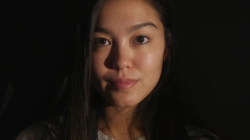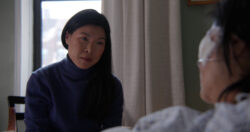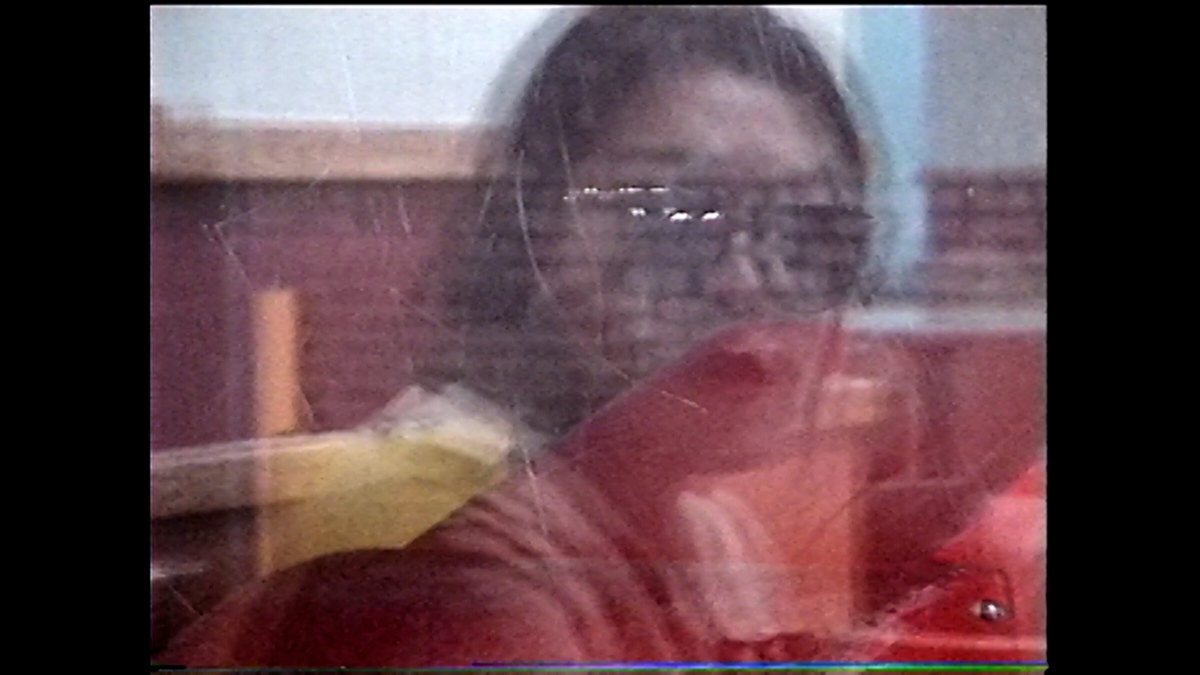The zeitgeist of Asians in the United States is defined by questions: How do we bear the sacrifices of our families who decided to stake our futures on this land? With whom do we connect as a nationality defined by the world’s ethnicities? And as we look for the right direction, how do we walk forward and bear the sacrifices we ourselves will make as Asian Americans?
Our scramble for answers has increased twofold as we encounter an era defined by a pandemic, heightened anti-Asian hate, and a swiftly-splintering economic and political climate. Perhaps through the art of filmmaking, we can find answers given to us in more visceral ways.
Our staff watched these shorts from the Asian American International Film Festival’s “Leading from the Front” series. You can now relive the experience through our eyes.
BON VOYAGE
Watched by: Eve Golecruz
Jiawen Li’s short narrative, “Bon Voyage,” explores memory and reality told from the backseat of a car. In a compilation of driving scenes, we observe the vulnerable moments of a loving relationship flourish and end as monologues and bits of news covering the COVID-19 pandemic fill the silence. By a surprise ending, we realize the purpose for the style of the film and witness the downfall of our protagonist’s relationship.
Li’s experimental short analyzes the human disconnection between memory and emotions, delving into the story of a heartbroken man ultimately unable to separate the two. In the opening monologue, our protagonist (Jiawen Li) notes the art of forgetting as a means for a person to keep moving in life, yet the film itself presents the opposite. What happens to the person who can’t move on from the pain of their memories?
BUS GIRL
Watched by: Eve Golecruz
Passion meets reward for an overlooked kitchen busser in Jessica Henwick’s short narrative, “Bus Girl.” The film tells the story of a young woman named June (Jessica Henwick), a university dropout pursuing a passion for cooking and is now working in her new job as a bus girl. At home, June heads the kitchen and masterfully cooks full course meals, entranced by the techniques and styles of freshly made foods. At work, she’s the untold chef, restricted to her work as a busser in a kitchen that doesn’t care for the bottom of the hierarchy. June’s night changes when an opportunity presents itself for her to prove her worth in the kitchen. Henwick brings surreal and complementary lighting schemes paired with fast-paced camera movements to depict the bustling atmosphere behind the restaurant and the busy life ahead for June.
ELVIS OF LAOS
Watched by: Eve Golecruz
What does Elvis Presley have to do with this Laotian family? Director Van Ditthavong’s “Elvis of Laos” describes the famous singer’s influence on his father, Voradeth Ditthavong, a popular Lao singer. The documentary explores the American dream that Elvis represents and how it’s closely tied to Voradeth’s journey and, eventually, his young granddaughter’s dream to become a dancer. Ditthavong tells his own story of immigrating to the United States and explores the American Dream’s connection between arts and aspirations, and survival and livelihood. Through this eleven-minute short, he highlights how his family’s generational pursuit of passions manifest for a retired musician and an innocent, budding artist.
EXHAUSTED
Watched by: Tracy Chung
Tiffany Jiang, the writer and director of “Exhausted,” filmed herself in front of a bathroom mirror, in what she describes as her “nightly routine on the night of the Atlanta spa murders.” The camera is aimed at the mirror, so it is capturing the reflection of her fae, and at times, only a partial view of Jiang’s face is visible. The routine consists of Jiang taking a makeup remover cleansing wipe to her face, which initially appears to be free of makeup. She takes the cloth slowly to her face, gently wiping it across her forehead, cheeks, eyes, chin, neck, spending extra time to self-soothe across the brow. If the shot were a still, it would look similar to a facepalm, but no slap. Only what we the viewers can apprehend as sadness, frustration, and…exhaustion.
Several Asian spiritual traditions believe in the third eye, which is meant to be the “mind’s eye,” or a way of seeing beyond normal perception, and possibly a way to achieve enlightenment. This film and the despair that it portrays, through the solitary view of a young, Asian woman’s face in a mirror, seems to be yearning for a different sight to see.
Asian Americans have always wanted to be seen in the U.S. Whether we’ve wanted to be seen as white-but-not-quite high achievers (model minority myth), or as racialized yellows who stand in solidarity with people of color (Asian American movement), the community has always struggled with visibility in the U.S. imaginary. In a brief social media feed at the end of the film, a quote from actor Steven Yeun speaks to this invisibility: “Sometimes I wonder if the Asian American experience is what it’s like when you’re thinking about everyone else, but no one is thinking about you.” Jiang’s film cleverly and poignantly captures this feeling of being dropped.
There is a moment in the film when suddenly she is wearing eye makeup, which is…noticeable. Jiang shared that in the editing process, it was an intentional decision to set the footage to play backwards. The playback of the woman’s face with makeup coincides with journalist and activist Helen Zia’s powerful statement, in rebuttal of the police chief’s statement about the shooter. The viewer looks at Jiang, who looks at herself in the mirror, and together we listen to news media and read social media. This was all we had at that moment in time, to connect and to grieve. Jiang gives us this short film to create that space that has been so hard to claim.

(Image Credit: Yi-Chiang Lin)
UNFINISHED FILM
Watched by: Tracy Chung
“The Unfinished Film” in many ways is literally just that: a work-in-progress. It is the beautiful collection of Yi-Chiang Lin, a Taiwanese “image maker” that includes footage and photography from a just-begun feature film. Lin shares: “The storyline was about a Taiwanese novelist who comes to New York trying to search for his ex-lover […] they haven’t met for a decade.” We are introduced to a black-and-white photographic Image of a woman’s face. Her full visage is obscured, as she has been lost to the narrator for 10 years. The seeds of a love story, a journey to find love again, the attempt to repair a broken heart, or all of those things – matters of the heart.
But the story shifts to a meta-narrative of the filmmaker. Lin states, in sort of a cameo moment, that the love story is fictional and that it was supposed to become his first feature film. He shares that while shooting the film, he got stuck in New York City during the pandemic. This is when things get real.
Or do they? Art persists, and is capable of taking on many forms. Lin says, “At the beginning of the film, I was trying to use myself as a first-person narrator to obscure the border between reality and fiction. I found this could be an interesting idea because I am also a person trying to find something in New York.”
The reality of the pandemic and its impact on Lin and his work feels very raw. Lin describes the “endless wait for the unknown” while shooting was suspended, and how street photography was his way of trying to preserve evidence of his existence.
There is nostalgia and a longing for connection, but Lin and the unrealized protagonist are suspended in time. This suspension brings on depression and feelings of self-doubt. The milestone of turning 30 has meaning for Lin, in that he had set the goal of completing his first feature film by the age of 30. The feature, like for many successful filmmakers, was supposed to be his creative coming out, his debut, and it was supposed to happen already.
The suspension in time and place, as depicted in this documentary, brings some interesting retrospective footage and reflective thoughts and images. The film shifts again, to the recent past when the narrator and his friends took a road trip to Texas, inspired by Wim Wenders’ film, “Paris, Texas.” The friends find Port Arthur, where a scene from the film was shot against a building mural. With their phones, they recreate their own “live action” version of the scene. A brief moment of color film marks the memory.
Lin remarks that Wenders’ “usually depicts lonely characters, endless trips, and ethereal affections in life” through the filter of a European director’s “cultural anxiety” in America. New York City was Lin’s “dream city,” an artistic mythos. Perhaps it still is, but now it is less elusive.
TO REPAIR 修理
Watched by: Demi Guo
Kintsugi has been a trending concept for years now. In “To Repair,” Japanese American artist Erin Shigaki muses on its healing nature not only on ceramic, but as the golden line that bears the weight of intergenerational trauma. As she paints the lines around a black-and-white photograph of her family, she calls upon the “golden light” of her ancestors, asking for the strength that bore them through the World War II incarceration of her community.
It is not, however, just about reaping the glory sowed by the tears of the past. She explicitly makes a call to action: As Japanese Americans who intimately understand systemic injustice, she calls for a “necessary and precious solidarity” with the Black reparations movement.

(Image Credit: Ashley Lobao)
WASIAN
Watched by: Jamie Parcon
Hey yo, WASIAN check! After creating a video for the TikTok trend highlighting the half-white, half-Asian population, filmmaker Ashley Lobao explores being “Wasian” in her documentary short.
#wasian may be a social media trend, but for Lobao, it was just normal. She shares four minutes of her own home videos, and the viewers get to know the daughter of a father from Massachusetts and a mother from Malaysia. Lobao exclaims, “It’s because I’m mixed – that’s what makes me feel special.”

(Image Credit: Rachel Lin)
GREAT LISTENER
Watched by: Jamie Parcon
Written, produced and starring Rachel Lin, this short film directed by Tristan Nash shows an actress auditioning for the role of “Great Listener.” While the role may sound simple enough, the actress looks deep within to present a complex emotion on camera.
The main dialogue of the film is a one-sided conversation at a hospital room between Lin’s character and her comatose mother. Unsure of what to say, Lin describes a specific childhood memory with her mother at an indoor playground.
The mother responds with a tender and gentle hand squeeze showing Lin that she is listening.
And with that, the audition goes well!
DE CLOSIN NIGHT
Watched by: Jamie Parcon
Learning a second language is not easy. Speaking it is even harder, especially when you get subconscious about sounding different than the natives. “De Closin Night,” directed by Shicong Zhu, opens with an acting class practicing vocal exercises. On screen, we are treated to fun graphics captioning the phonetics being made. We see and hear subtle differences from our protagonist, Siyi, such as not pronouncing her ngs (“teddin and the spreadin” instead of “teddinG and the spreadinG”).
Siyi (played by writer/producer Ellen Rouwen Chen) is a first-generation Chinese student with hopes to have a part in her college performance. Her harsh professor (Rod Menzies) will grant her the closing night performance … only if she improves (improve, meaning gets rid of her accent).
The professor constantly points out that Jane, who is the other Asian in the class, doesn’t have the same problem as Siyi. Though he does acknowledge that English is Siyi’s second language, he doesn’t offer extra exercises to help her get better. The pressure is on to get the performance since her parents are planning to fly to America to watch her.
Determined, Siyi immerses herself with English. She changes her cell phone language to English, and refuses to speak Mandarin on video calls with her mom, or even to order food. Caught up in the work of it all, Siyi forgets why she wanted to act in the first place.
In a touching text message exchange (in Mandarin) with a cousin overseas, Siyi admits she feels like she’s drifting away from her old life and doesn’t know who she is anymore. The cousin reminds her that their parents gave them the strength to find themselves.
And it’s a good message. Lose your accent if you must, but don’t lose yourself.
The “Leading from the Front” shorts block screened at the 45th Asian American International Film Festival.

